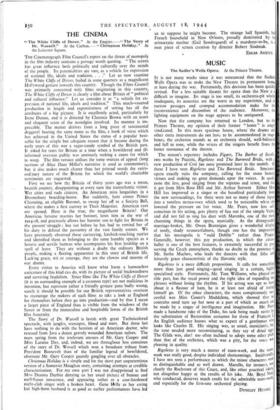MUSIC
The Sadler's Wells Opera. At the Princes Theatre.
IT is not many weeks since it was announced that the Sadler's Wells Opera was to make the New Theatre its permanent home, at least during the war. Fortunately, this decision has been quickly revised. For a less suitable theatre for opera than the New it g difficult to imagine. Its stage is too small, its orchestra-pit wholly inadequate, its acoustics are the worst in my experience, and its narrow passages and cramped accommodation make for the inconvenience and discomfort of the audience. Moreover, the lighting equipment on the stage appears to be antiquated.
Now that the company has returned to London, but to the Princes Theatre, my opinion of their former " home " is amply vindicated. In this more spacious house, where' the drums and other extra instruments do not have to be accommodated in stage. boxes, the orchestra sounds as an orchestra should, well-balanced and full in tone, while the voices of the singers benefit from the better resonance of the theatre.
The season's repertory includes Figaro, The Barber of Sevin!, two works by Puccini, Rigoletto and The Bartered Bride, with a new production of Cosi fan tulle promised later in the month. Of these I have seen Rigoletto and The Bartered Bride. Smetana's opera exactly suits the company, calling for the more homely virtues and making no great demands upor the voices. It needs, none the less, good singing from the soprano and tenor, and this it got from Miss Rose Hill and Mr. Arthur Servent Either Miss Hill has improved as a singer or she benefited particularly from the new surroundings, for there were not so many of those lapse into a toneless mezza-voce which used to be noticeable wirm she lowered the pressure on l'er voice. Mr. Pears, now less self• conscious in his acting, gets plenty of fun out of the simple Vasha, and did not fail to sing his duet with Marenka, one of the most charming things in the opera, musically. As the disreputable marriage-broker, Mr. Owen Brannigan gives a wonderful display of seedy, shady resourcefulness, though one has the impression that his metropolis is " ould Doblin" rather than Prague Generally, however, this gay production, in which the circus- ballet is one of the best features, is extremely successful in pre- serving the Czech atmosphere, thanks no doubt to the presence d Mr. Sasha Machov, who leads the dancers with that lithe and leisurely grace characteristic of the Slavonic style.
Rigoletto is a more difficult proposition. It calls for something more than just good singing—good singing in a certain, highly specialised style. Fortunately, Mr. Tom Williams, who played the title part, has the vocal power and the right idea of expanding the phrases without losing the rhythm. If his acting was apt to have about it a flavour of ham, he is at least not afraid of letting himself go. Of the other characters, the most conspicuously six' cessful was Miss Coates's Maddalena, which showed that he contralto need turn up her nose at a part of which so much can be made by a singer of intelligence and imagination. Mr. Pears made a handsome rake of the Duke, his task being made easier by the substitution of Restoration" costumes for those of Francois 1• An English audience knows what to expect of a gentleman Who looks like Charles II. His singing was, as usual, musicianly, hdt the tone needed more reconstituting, as they say of dried ellP. The Gilda was, alas! too often inclined to adopt some other pitch than that of the orchestra, which was a pity, for the voice was pleasing in quality.
Rigoletto is very much a matter of team-work, and the team work was really good, despite individual shortcomings. Incidentally, I have not seen a performance in which the minor characters wes' so distinguishable and so well drawn. Marullo, for instance, was clearly the Rochester of this Court, and, like other practical iokels; not altogether happy at the results of his joke. Mr. 'Boyd No, who conducted, deserves much credit for the admirable team-W0 and especially for the first-rate orchestral playing.






















 Previous page
Previous page